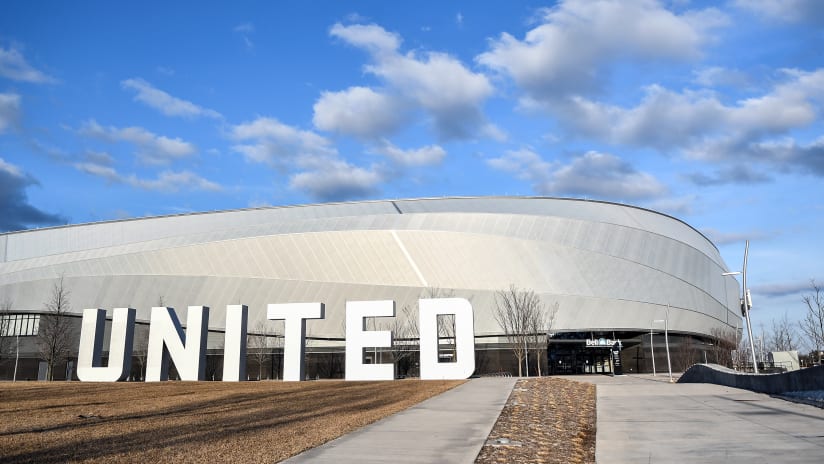The following statement was written by Minnesota United midfielder Jacori Hayes in response to the death of George Floyd and resulting protests:
I offer my condolences to the family and friends of George Floyd. No one should have to endure this level of pain, especially when the act was done by those ordered to protect and serve.
My parents and family worked hard for me to have a leg up in life. I grew up in Prince George’s County, Maryland, one of the most affluent African American-majority counties in the country. I attended private school through high school and graduated from a top 25 university for college. But, I am still Black in America. While I’ve never had a physical altercation with an officer, there is still a mental and emotional hold that I experience around the police. I remember being asked to show my college ID to re-enter campus, while my white roommates were able to walk by unbothered. I remember eating pizza in Chicago with friends. I had to prove who I was to a police officer because I looked like someone he was allegedly looking for. I have seen too many times people who look like me murdered for small infractions or no infractions at all. I walk on eggshells around the police. I have been fortunate that my interactions have led to nothing physical, but as many events in recent years have proved, this is not always the case.
Immediately after seeing the video of George Floyd, I went numb. I felt helpless. This is a vicious cycle. A black person is murdered at the hands of a police officer. National outrage ensues. A couple of weeks later, everything returns to the way it was until another black person is murdered. It seems every few weeks, I learn another name. Another person murdered due to racial prejudice. In the end, I feel lost and confused.
WEB DuBois said in his book The Souls of Black Folk:
“It is a peculiar sensation, this double-consciousness, this sense of always looking at one’s self through the eyes of others, of measuring one’s soul by the tape of a world that looks on in amused contempt and pity. One ever feels his twoness,- an American, a Negro; two souls, two thoughts, two unreconciled strivings; two warring ideals in one dark body, whose dogged strength alone keeps it from being torn asunder … this longing to attain self-conscious manhood, to merge his double self into a better and truer self. In this merging he wishes neither of the older selves to be lost. He would not Africanize America, for America has too much to teach the world and Africa. He would not bleach his Negro soul in a flood of white Americanism, for he knows that Negro blood has a message for the world. He simply wishes to make it possible for a man to be both a Negro and an American, without being cursed and spit upon by his fellows, without having the doors of Opportunity closed roughly in his face.”
This was written in 1901, but African Americans have the same experiences today. Yes, we have made major strides since then, but over 100 years later, we are still disadvantaged and murdered because of the color of our skin. This country loves our culture, loves our music, and loves our athletes. But, anytime we speak to the injustices, the disenfranchisement, the wealth or health gaps, or any other issues, our voices are not truly heard or respected.
Throughout time, protests have been a vehicle to express ideas, concerns, and desires for change and social justice. However, no matter what form of protest African Americans have chosen, there’s an issue with how it’s done. The root cause of the protest is never addressed. For example, there was a problem with kneeling. Basketball players were told social injustice was not their job, to shut up and dribble, and the latest example, protestors were called “thugs” by the nation’s highest office. I’m tired of the fake appreciations for Muhammad Ali and Martin Luther King Jr. every February. Those men were hated during their time. A lot of the people singing their praise for standing against the face of oppression are the same ones comfortable with the injustices we face. I appreciate the posts on social media from friends during this time. But, what is going to happen when it’s no longer “cool” to voice these opinions. Will you vote for candidates that lower your taxes but completely disregard the social injustices of minorities? Will you return to silence when I and others like me still face racial prejudice?
In the case with George Floyd, all four policemen are complicit to the murder and should be held accountable to the fullest extent of the law. Only arresting the officer whose knee was responsible for killing George Floyd is inadequate when you have three other accomplices. Even if all four are sentenced, we will not have social justice. The real issue won’t be solved. The cycle will continue until we handle the racism in our society. I want to be optimistic, but I’m afraid that racism is so ingrained in the fabric of the United States that the issue will always persist. As a country, we have to address our whole history, acknowledge how this country built its wealth, how this country has failed African Americans consistently, and its citizens who are consistently marginalized before we can ever say, without hypocrisy, we are the shining country on the hill. And so, the journey to end racial prejudice and social injustice must continue...
“Not everything that is faced can be changed, but nothing can be changed until it is faced.”
–James Baldwin




